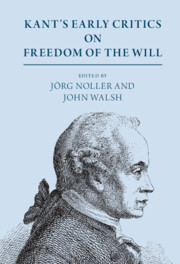Refine search
Actions for selected content:
12 results
5 - Freedom and Internalism
-
- Book:
- Kant's Metaphysics of the Will
- Published online:
- 06 November 2025
- Print publication:
- 09 October 2025, pp 110-136
-
- Chapter
- Export citation
6 - The Grounding Argument
-
- Book:
- Kant's Metaphysics of the Will
- Published online:
- 06 November 2025
- Print publication:
- 09 October 2025, pp 137-179
-
- Chapter
- Export citation
Chapter 8 - Perpetual Peace and Purified Patriotism
-
- Book:
- Herder and Enlightenment Politics
- Published online:
- 30 March 2023
- Print publication:
- 06 April 2023, pp 276-323
-
- Chapter
- Export citation
Chapter 2 - The Ontological Proof as “the True Critique of the Categories and of Reason”
-
- Book:
- Hegel's Logic and Metaphysics
- Published online:
- 26 April 2023
- Print publication:
- 26 January 2023, pp 63-107
-
- Chapter
- Export citation
1 - Of Scholars and Miners
-
- Book:
- Underground Mathematics
- Published online:
- 08 December 2022
- Print publication:
- 22 December 2022, pp 20-49
-
- Chapter
- Export citation
Johann Gottlieb Fichte, Review of “Skeptical Reflections on Freedom of the Will with Respect to the Most Recent Theories on the Same by Leonhard Creuzer, 1793,” Allgemeine Literatur-Zeitung 303 (1793), Cols. 201–205
- from IV - Freedom and Skepticism
-
- Book:
- Kant's Early Critics on Freedom of the Will
- Published online:
- 24 March 2022
- Print publication:
- 31 March 2022, pp 207-212
-
- Chapter
- Export citation
Friedrich Wilhelm Joseph Schelling, “General Overview of the Most Recent Philosophical Literature,” Philosophisches Journal 7(2) (Jena and Leipzig, 1797), 105–186
- from V - Freedom and Choice
-
- Book:
- Kant's Early Critics on Freedom of the Will
- Published online:
- 24 March 2022
- Print publication:
- 31 March 2022, pp 250-262
-
- Chapter
- Export citation
Karl Leonhard Reinhold, Contributions to the Correction of Previous Misunderstandings of Philosophers, Volume ii, Concerning the Foundation of Philosophical Knowledge, Metaphysics, Ethics, Moral Religion, and Doctrine of Taste, Jena, 1794
- from II - Freedom and Imputability
-
- Book:
- Kant's Early Critics on Freedom of the Will
- Published online:
- 24 March 2022
- Print publication:
- 31 March 2022, pp 93-116
-
- Chapter
- Export citation
Karl Leonhard Reinhold, “Some Remarks on the Concept of the Freedom of the Will, Posed by I. Kant in the Introduction to the Metaphysical Foundations of the Doctrine of Right,” in Auswahl vermischter Schriften, Volume ii, Jena, 1797, 364–400
- from V - Freedom and Choice
-
- Book:
- Kant's Early Critics on Freedom of the Will
- Published online:
- 24 March 2022
- Print publication:
- 31 March 2022, pp 238-249
-
- Chapter
- Export citation
Leonhard Creuzer, Skeptical Reflections on Freedom of the Will with Respect to the Most Recent Theories on the Same, Giessen, 1793
- from IV - Freedom and Skepticism
-
- Book:
- Kant's Early Critics on Freedom of the Will
- Published online:
- 24 March 2022
- Print publication:
- 31 March 2022, pp 147-177
-
- Chapter
- Export citation

Kant's Early Critics on Freedom of the Will
-
- Published online:
- 24 March 2022
- Print publication:
- 31 March 2022
7 - Freedom and Duty
-
-
- Book:
- Practical Philosophy from Kant to Hegel
- Published online:
- 16 March 2021
- Print publication:
- 18 March 2021, pp 118-137
-
- Chapter
- Export citation
